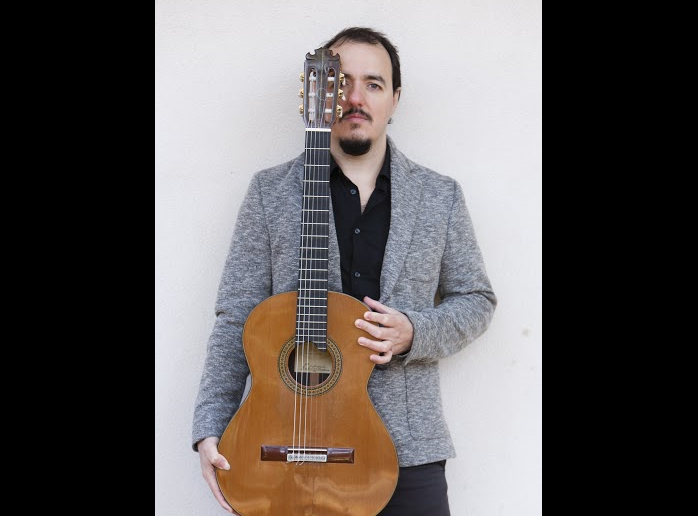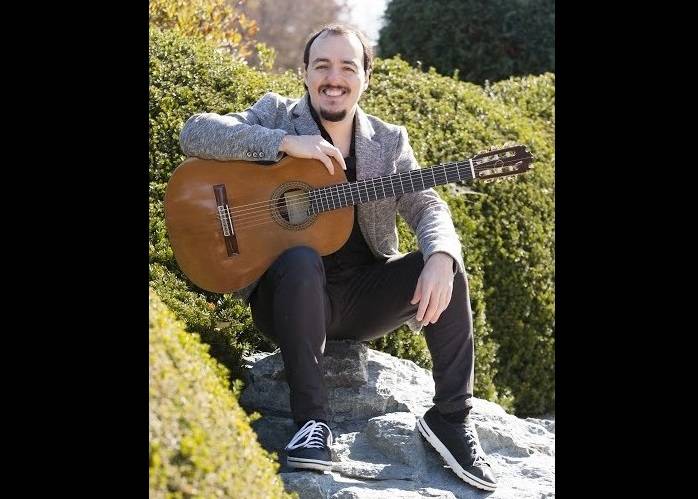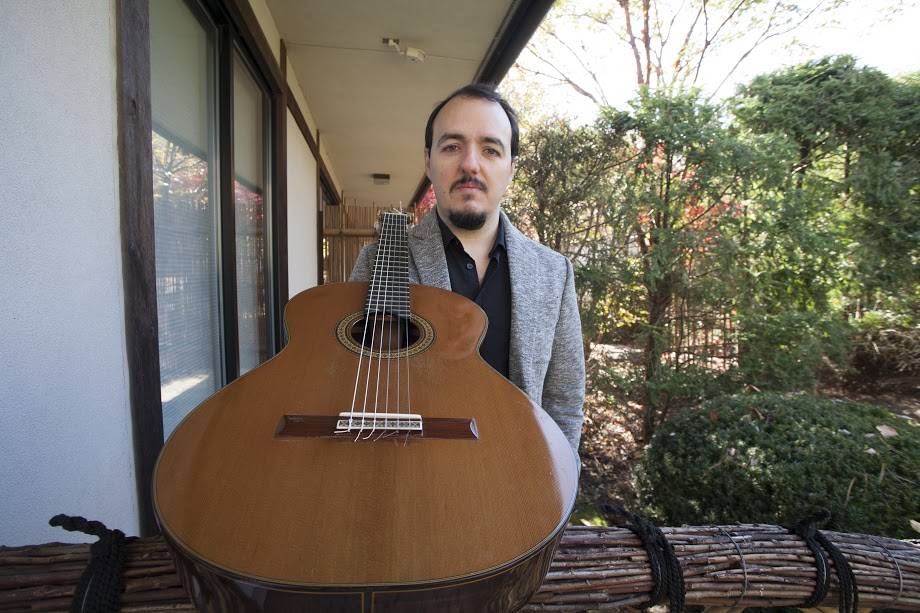When you visit Champaign’s lauded guitar store The Upper Bout, you’ll be quick to find what you’re looking for: Gear, amps and accessories, and of course gorgeous, top-of-the-line guitars and bass guitars. The Upper Bout is loved for their diverse selection of products and genuine hospitality, but also for what they provide beyond the retail level. It might not be common knowledge that they also offer comprehensive and original music lessons. Classes in voice, piano, and string instruments are provided by some of the best music instructors the area has to offer. They each cultivate distinguished methods in their instruction that make for a unique class experience not found elsewhere.
One of those instructors is Dr. Guido Sanchez-Portuguez, whose specialty is guitar. A native of Costa-Rica, Sanchez-Portuguez is a renowned and respected artist in his own right. He specializes in classical guitar with Latin themes and styles, such as bossa nova and tango, while also embracing eclecticism in both his music-making and teaching. An accomplished scholar as well as musician, Sanchez-Portuguez graduated with honors from the University of Costa Rica’s School of Music for both his Bachelor’s and Master’s degree, and then received his Doctor of Music in Guitar from the Jacobs School of Music in Indiana. Over his career, Sanchez-Portuguez has worked with dozens of highly respected artists in his field and taken his talents overseas to play for numerous countries. His prestige hasn’t made him stodgy, however; Sanchez-Portuguez has taught for two decades in all sorts of different classrooms. While he may specialize in Latin acoustic music, he is well-versed in a variety of other techniques and styles. The Upper Bout is just one of his current class locations, and his students come from all walks of life.
Sanchez-Portuguez also holds hands-on concerts at The Upper Bout where attendees can be performers. I spoke with Sanchez-Portuguez about his role as a guitar instructor at The Upper Bout and how his life experience has come together to shape the distinct kinds of classes he provides.

Smile Politely: What initially compelled you to play guitar?
Guido Sanchez-Portuguez: When I was fourteen, I was really into heavy metal and was absolutely mesmerized by what the guitarists of the time (late 80s) were doing with their instruments. The whole “shredder” culture of heavy metal guitar was the catalyst that sparked my interest in the guitar. It didn’t take long until I asked my parents for lessons, which I started in the summer of 1989. After several years of playing with my metal band, some of the initial attraction to the style and to the electric guitar in general waned — I started feeling more and more attracted to the acoustic guitar and to other styles like flamenco, world music, and jazz. It was also during this time that I auditioned for the classical guitar major at the University of Costa Rica and began my undergraduate studies in music. From that point on, my focus was on classical guitar, but I never completely abandoned other styles of music. During my college years in Costa Rica, I also started composing my own music, and before I knew it, it was serious — I started thinking of myself as a performer/composer, which is something of a rarity in the world of classical music. Composition and Music Theory became essential to the point that they became my minors while I worked on my Doctor of Music degree at Indiana University. Today, almost 30 years later, it’s pretty surreal to look back and see how this whole adventure started!
SP: What brought you to Champaign-Urbana?
Sanchez-Portuguez: Family. I moved to C-U about three years ago to be with my wife, Susie, who works in the Linguistics Department at the U of I. We love this town, and I think it’s a diverse and progressive little place to raise our two kids, Sufijan and Hazel.
SP: Do you approach classical guitar differently in America than you have in your native Costa Rica and other countries?
Sanchez-Portuguez: In a way. The classical guitar world traditionally tends to be a little stiff and maybe even elitist. Part of it is because of the “solo” nature of the instrument, which has inevitably isolated it and put it in a complicated place within the concert-hall family of instruments. When you go hear a classical guitar concert, 95% of the time you see one guitarist playing a very serious type of program all by himself. So, if you’re not familiar with the style, repertoire and culture of a classical guitar concert, it could be very easy to feel out of place or simply not into it. Having said that, I also think that the majority of the people that haven’t been to a classical guitar recital are missing out on a magical experience with one of the most beautiful-sounding instruments. That’s why I make it a point to include a big diversity of styles and repertoire in my concerts.
For many years I have been a strong advocate of making classical music concerts more like popular music concerts. If you go to one of my recitals you’ll notice that I make sure to actively engage with the audience; I make a point of providing historical background to the pieces I play — I usually choose pieces that are attractive and easy to listen to and then mix them with more academic works. Also, and notably, I always try to go back to my own roots and play one or two numbers on the electric or electric-acoustic guitar. For example, I recently been collaborating with a local percussionist (Harold Agosto), and we started revamping pieces that were originally written for the solo classical guitar, giving them a completely new life by adding the Peruvian “cajón”, drum set, light percussion, and other types of effects. He played a few pieces with me at my last Upper Bout performance. In another contrast from Costa Rica, the United States has a long-standing tradition of steel-string guitar playing, ranging from simple strumming styles to complex fingerstyle techniques, whereas the nylon-string classical guitar isn’t as popular.
If you step into a guitar store in Latin America, most of the guitars you see will be nylon-string instruments with maybe a few steel-strings. The opposite happens in the U.S. This translates, both in my personal experience and from a cultural perspective, into a more didactic approach to my classical guitar recitals — I’m trying to raise awareness about the versatility and beauty of the instrument.
Sanchez-Portuguez: Yes, for more than a decade I have been in love with my 2003 cedar-top and Brazilian rosewood “Contreras” from Madrid. It’s one of the best guitars I’ve ever played.
SP: How often do you “plug in” and go electric?
Sanchez-Portuguez: Very often! I have an electric guitar and a bunch of gear to play around with. I also play the bass guitar and have been the bass player for a couple of rock and country bands here in the U.S.
SP: Why did you decide to become a teacher?
Sanchez-Portuguez: When you dedicate your life to music, it becomes not only inevitable but necessary to teach. I would argue that only a very small percentage of professional musicians go through their lives without teaching. It can be just in the form of frequent masterclasses or workshops, or it could be by having individual students in a private studio or within an institution. As a musician you always feel compelled to share, and what better way to do that than teaching? I was around 19 years old when I started giving private electric guitar lessons at my parents’ house. It was awesome to be able to have fun teaching other kids and at the same time to get paid for it.
From then on, I always had at least two or three private students at home until I became a teaching assistant at the university where I started teaching classical guitar. After that, I co-founded a guitar school with some of my guitar friends in Costa Rica and almost 25 years later I have accumulated teaching experience in almost every style of guitar playing with people of all ages, from 5-year olds to seniors, both privately to diverse levels to advanced academic levels in colleges.

SP: Can you tell us about your classes at The Upper Bout?
Sanchez-Portuguez: I have been teaching at The Upper Bout since the summer of 2014. The guys at the UB have been welcoming and professional from the very beginning, and I owe them my debt of gratitude for taking me on as one of their instructors. I currently have about 15 private students ranging from 8-year-olds to seniors, encompassing virtually every style and technique. I teach classical guitar, acoustic fingerstyle, Latin guitar, jazz, pop, rock, metal, etc. I have also taught group lessons covering guitar ensemble pieces and Latin American rhythms and techniques. I’ve really enjoyed the enthusiasm and dedication of all of my students. Earlier this year, one of my youngest was awarded third prize during the Indiana Guitar Festival and Competition.
SP: Can you explain the concept of a master class versus a regular class?
Sanchez-Portuguez: A masterclass is a public lesson in which a student is taught more or less in the same manner as during a private lesson but in front of an audience. It usually takes between 20 and 40 minutes per student, and they can sometimes have as many as 5 or 6 students performing. Masterclasses are very common in the classical music world, they especially take place during festivals, summer camps, or when a high-level musician is invited to perform as a guest for an institution such as a university or music school. The difference in comparison with a regular class or lesson lies in its “open to the public” nature.
How will this event be different? What can we expect from this show/class? I’m including some pieces that do not belong to the standard classical guitar repertoire along with some works of my own. The concert will have a nice blend of traditional repertoire and a more popular-music sounding selection, ranging from rock to jazz. There might even be a little electronic surprise thrown in. At the end of my show, I will begin the masterclass for those who wish to play for me. I will invite members of the audience to come forward and perform for me—it will be fun!
SP: What’s one of the best adventures that your music has taken you on?
Sanchez-Portuguez: I don’t think I could say that there is that “one experience” that takes the cake. It has all been a surreal trip, even from the very beginning when I played metal with my brother and my best friends at my parents’ house. At that time I never would’ve imagined that I would end up touring throughout the world, meeting lots of amazing and famous musicians, recording eight albums, earning four music degrees, and forming a family far away from my home country. I can very confidently say that the best adventure has been to dedicate my life to music.
Guido Sanchez-Portuguez will be leading a Concert with Class at The Upper Bout on Thursday, February 23rd, at 7:30 p.m. Admission is $10. Find more information on Guido and his music on his website.








